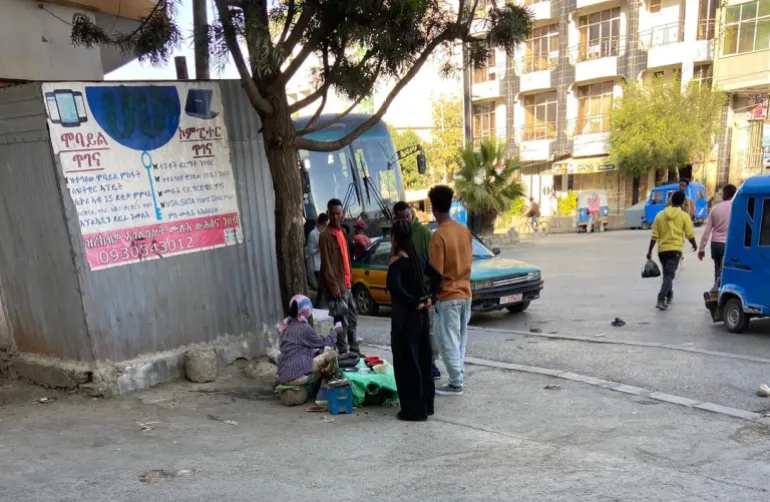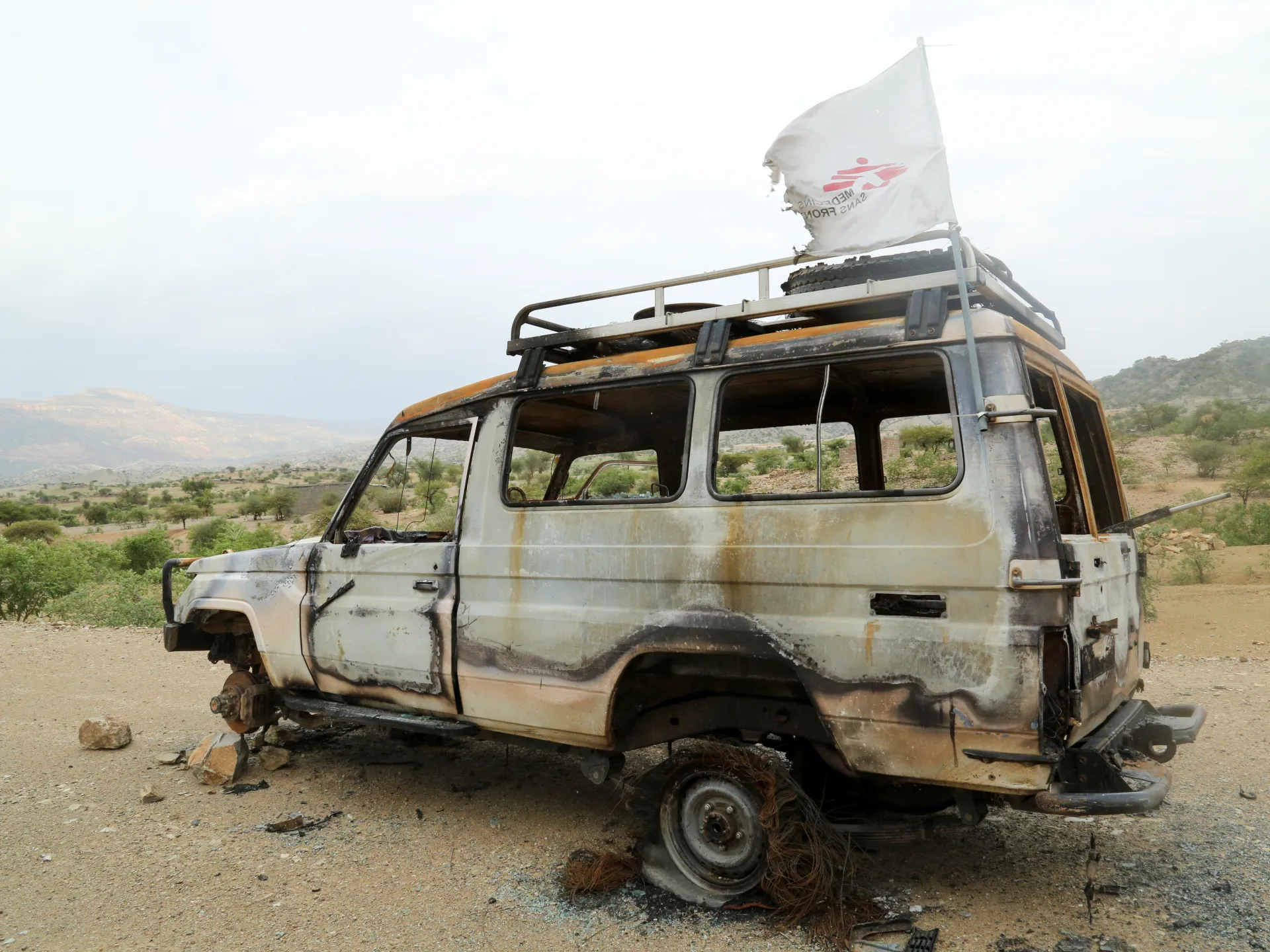Fears of ‘slow, certain death’ stalk Tigray amid rumblings of renewed war | Conflict News
Tigray, Ethiopia – Saba Gedion was 17 when the peace deal that ended the conflict in her homeland of Tigray in northern Ethiopia was signed in 2022.
She hoped then that fighting would be a thing of the past, but the last few months have convinced her that strife is once again looming, and she feels paralysed with despair.
Recommended Stories
list of 3 itemsend of list
“Many people are leaving the region in droves,” Gedion told Al Jazeera as she sat under the shade of a tree, selling coffee to the occasional customer in an area frequented by internally displaced people (IDPs) in Tigray’s capital, Mekelle.
Gedion – herself a displaced person – is from the town of Humera, a now-disputed area with the Amhara region that witnessed heavy clashes during the 2020-2022 war between Ethiopia’s federal government and the Tigray People’s Liberation Front (TPLF).
The now-21-year-old remembers the horrors she witnessed. Some of her family were killed, while others were abducted into neighbouring Eritrea, she says. She has not heard from them since.
Though she made it out alive, her life was turned upside-down when she was forced to flee to Mekelle for safety.
Years later, Gedion sees similar patterns as people leave Tigray – most headed to the neighbouring Afar region – once again looking for the safety that has become elusive at home.
“Recurring conflict and civil war have made us zombies rather than citizens,” she told Al Jazeera.
In recent weeks, enmity between Ethiopia and Eritrea has escalated amid separate accusations by both sides.
Speaking to Ethiopia’s parliament in early February, Prime Minister Abiy Ahmed addressed his landlocked country’s access to the sea, saying “the Red Sea and Ethiopia cannot remain separated forever”. This has led to accusations by Eritrea that Addis Ababa is seeking to invade its country and trying to reclaim the Red Sea Assab seaport, which it lost in 1993 with the independence of Eritrea.
Ethiopia, meanwhile, has accused Eritrean troops of occupying its territory along parts of their shared border, and called for the immediate withdrawal of soldiers from the towns of Sheraro and Gulomakada, among others. Addis Ababa also accuses Eritrea of arming rebels in the vast Horn of Africa country.
Observers say the heightening tensions point to an impending war between the two countries – one that could once again involve Tigray.

Unhealed scars of war
In Tigray’s capital, a once-booming city of tourism and business, most streets are quiet.
The young people who previously frequented cafes are now often seen applying for visas and speaking with smugglers in the hope of leaving Tigray.
Helen Gessese, 36, lives in a makeshift IDP camp on the outskirts of Mekelle. She worries about what will become of the already struggling region should another conflict erupt.
Gessese is an ethnic Irob, a persecuted Catholic minority group from the border town of Dewhan in the northeastern part of Tigray.
During the Tigray war, several of her family members were kidnapped, she said, as Eritrean troops expanded their hold of the area.
As the war intensified, she fled to Mekelle, about 150km away, looking for safety. Her elderly parents were too frail to join her on foot, so she was forced to leave them behind. Like Gedion, she has not heard from them or the rest of her family since 2022.
“My life has been held back, not knowing if my elderly parents are still alive,” she told Al Jazeera, the stress of the last few years making her seem much older than she is.
In Mekelle, it is not uncommon to meet people who are anguished or frustrated – some by the renewed tensions, and many by the trauma of the previous conflict.
More than 80 percent of hospitals were left in ruins in Tigray during the war, according to humanitarian organisations, while sexual violence that defined the two-year conflict is still a recurring issue. Hundreds of thousands of young people are still out of school, foreign investment that created jobs in the past has in large part evaporated, and the economy remains crippled after years of war.
Meanwhile, nearly four years later, the federal government’s decision to withhold foreign funds meant for the region is deepening a humanitarian crisis. The bulk of the public service in the region, for instance, has not been paid for months.
The Ethiopia-Eritrea relationship has also deteriorated in recent years.
The longstanding foes had waged war against each other between 1998 and 2000, but in 2018, they signed a peace deal. They then became allies during the 2020-2022 civil war in Tigray against common enemy, the TPLF.
But the relationship between Ethiopia and Eritrea has been in sharp decline since the signing of the 2022 accord that ended the Tigray war – an agreement that Asmara was not party to.

‘Acts of outright aggression’
Earlier this month, Ethiopia’s Minister of Foreign Affairs Gedion Timothewos wrote an open letter acknowledging the presence of Eritrean troops loitering on the Ethiopian side of the border and calling for them to leave.
“The incursion of Eritrean troops …” he wrote, “is not just provocations but acts of outright aggression.”
Asmara continues to deny the presence of its troops on the Ethiopian side, and Eritrean Minister of Information Yemane Gebremeskel has called such accusations “an agenda of war against Eritrea”.
As a sign of the worsening of the relationship between the two neighbours, Ethiopia’s Abiy, in his address to lawmakers early in February, also accused Eritrean troops of committing atrocities during the Tigray war. The accusation was a first from the prime minister, following repeated denials by his government about reported mass killings, looting and the destruction of factories by Eritrean troops during the Tigray conflict.
Eritrea’s government rejected Abiy’s claims about atrocities, with Gebremeskel calling them “cheap and despicable lies”, noting that Abiy’s government had until recently been “showering praises and state medals” on Eritrean army officers.
As the tensions escalate, many observers say war between the two is now inevitable and have called for dialogue and the de-escalation of the situation.
“The situation remains highly volatile and we fear that it will deteriorate, worsening the region’s already precarious human rights and humanitarian situation,” the United Nations Human Rights spokesperson, Ravina Shamdasani, said this month.
Kjetil Tronvoll, a professor of peace and conflict studies at Oslo New University College, told Al Jazeera a new war would have “wide-reaching implications for the region” – regardless of the outcome.
He believes the looming conflict between Ethiopia and Eritrea could take the shape of a new civil war, positioning Addis Ababa against Tigray’s leadership yet again.
From Ethiopia’s side, he argues the objective would be regime change in both Asmara and Mekelle, noting that “regime change in Eritrea may lead to Ethiopia gaining control of Assab”. For Asmara and Mekelle, the aim would also be regime change in Addis Ababa, he suggests.
“If it erupts, it will be devastating for Tigray,” Tronvoll said. “The outcome of such a war will likely fundamentally alter the political landscape of Ethiopia and the Horn [of Africa],” he warned, pointing out that regional states could also be pulled into a proxy war.

Fears for the future
For many in Tigray, memories of massacres committed during the 2020-2022 war are still fresh.
Axum, a UNESCO World Heritage site in the central zone of the Tigray region, is known for its tall obelisk relics of an ancient kingdom. But for 24 hours in November 2020, the city was the site of killings carried out by the Eritrean army. “Many hundreds of civilians” were killed, rights group Amnesty International said.
While the killings were denied by both the Eritrean and Ethiopian governments for many years, this month Abiy acknowledged they had taken place.
However, despite speaking of “mass killings” in Axum, he has been silent about the fact that the Ethiopian and Eritrean armies worked together openly as allies during that war.
Marta Keberom, a resident in her forties who hails from Axum, says very few people in her hometown have not been touched by violence in the last five years.
“The killings that happened during the war wasn’t just a conflict, it had the hallmark of a genocide where whole families were murdered without a cause,” she said of the killings that targeted Tigrayans.
“To relive that,” Keberom said, speaking at an IDP centre in Mekelle, would be “something I can’t begin to comprehend.”
Waiting for customers at her coffee stand in the city, Gedion is also afraid of what might come next.
She once aspired to be an engineer, but since being uprooted from her village, she now dreams of a future far away from Ethiopia.
She has already contacted a smuggler to help her leave, she says, through Libya and on towards the Mediterranean Sea – despite the extreme risks of such a journey.
“I would rather take a chance than die a slow, certain death with little future prospects,” she said.




